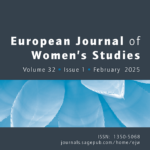 European Journal of Women’s Studies (Web)
European Journal of Women’s Studies (Web)
Proposals by: 14.04.2025
Ecofeminism, which emerged in the mid-1970s and 1980s as a field of transnational thought and activism, seems to have been redeveloped over the last decade in response to the ecological crisis. France has witnessed a kind of ‘ecofeminism boom’ to which the publication of Émilie Hache’s anthology Reclaim, recueil de textes écoféministes (2016) made a prominent contribution. Ecofeminist approaches have also (re)gained attention in Germany (Gottschlich/Hackfort/Schmitt/von Winterfeld 2022; Holland-Cunz 2014), in Belgium (Zitouni, 2019; Grandjean, 2024), in Spain (Mediavilla and Echavarren, 2021; Puelo, 2017), as well as in Southeastern Europe (Đurđević and Marjanić, 2024). This non-exhaustive overview reveals that despite this spread of literature, which has undoubtedly enabled Anglophone traditions to be historicised and discussed, the transnational and micro-regional circuits of the production and reception of European ecofeminism are still relatively undocumented.
This issue is an invitation to rethink ecofeminism from European perspectives and perspectives from ‘Europe Otherwise’ or ‘Europe as a creolized space’ (Boatcă, 2020). We invite submissions that examine the ways in which ecofeminist theory is currently discussed in Europe, and how, in this pluralistic context, the respective traditions of ecofeminist thought, and politics are constituted, re-articulated, criticised and transformed. We welcome abstracts that address any of the following, or other related questions:
1. Articulations of the concepts of nature and gender
– What are the theoretical challenges and reformulations of the concept of nature? How do they avoid the naturalisation of social structures while accounting for an adequate understanding of the materiality of the non-human world?
– Does ecofeminism renew existing theoretical debates on the concepts of nature, gender and ecology? Conversely, what are the debates and tensions brought to light by the theoretical categories employed in ecofeminist writings?
– How are colonial dimensions of the ecological disaster reflected in various ecofeminist traditions and what are the remaining open questions and blind spots? Continue reading

 AHRC-Network „Hidden lives: domestic servants in the European country house, c.1700-1850“; Jon Stobart, Manchester Metropolitan Univ.
AHRC-Network „Hidden lives: domestic servants in the European country house, c.1700-1850“; Jon Stobart, Manchester Metropolitan Univ.  Zweites Forum Geschlechtergeschichte/n für Dissertant:innen und Forscher:innen in Österreich und angrenzenden Regionen; Heidrun Zettelbauer und Katharina Scharf (Graz)
Zweites Forum Geschlechtergeschichte/n für Dissertant:innen und Forscher:innen in Österreich und angrenzenden Regionen; Heidrun Zettelbauer und Katharina Scharf (Graz) Verband feministischer Wissenschafteri*nnen (VfW); Reihe feminismen diskutieren in Koop. mit dem Depot
Verband feministischer Wissenschafteri*nnen (VfW); Reihe feminismen diskutieren in Koop. mit dem Depot  „Queergelesen“ Spezial: FrauenGenderBibliothek Saar und AK Queer der Univ. des Saarlandes
„Queergelesen“ Spezial: FrauenGenderBibliothek Saar und AK Queer der Univ. des Saarlandes  IPW-Lecture: Department of Political Science (IPW), Univ. of Vienna
IPW-Lecture: Department of Political Science (IPW), Univ. of Vienna  Österreichische Gesellschaft für Exilforschung (öge); Österreichische Exilbibliothek im Literaturhaus Wien; QWien
Österreichische Gesellschaft für Exilforschung (öge); Österreichische Exilbibliothek im Literaturhaus Wien; QWien  Special Issue of Women’s History Review; Co-Editors Susan R. Grayzel (Utah State Univ.) and Nicoletta F. Gullace (Univ. of New Hampshire)
Special Issue of Women’s History Review; Co-Editors Susan R. Grayzel (Utah State Univ.) and Nicoletta F. Gullace (Univ. of New Hampshire)